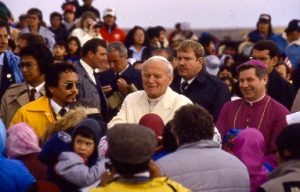Transformative Faith in Jesus
(Phil 3:3-8; Ps 105; Lk 15:1-10)
*************************************

With Bishop Denis Croteau OMI
When now St. Pope John Paul II returned to Canada in 1987 in fulfillment of his promise to meet with the Indigenous peoples of the North, I was in the line-up of concelebrating priests and bishops who got to meet him and shake his hand. As awesome as that experience was, I am sure it was nothing compared to the experience St. Paul shared with the Philippians in today’s readings.

Papal visit site
The liturgy today invites us to encounter and get to know Jesus just like St. Paul and let that encounter transform us through repentance like in the gospel.
Paul’s external accreditations on which he could depend for prestige and status are many, as he relates in the reading: circumcised, an Israelite, his ancestry, a Hebrew, a Pharisee, a zealous believer in Judaism and exact keeper of the law. All this he counts as worthless compared to encountering and knowing Jesus, hearing his voice and receiving his forgiveness – that is all that counts for him. All he wanted was to boast about Jesus Christ and be filled with his Spirit.
His enthusiasm and exuberance in his relationship with Jesus is an open invitation for us to strive to develop the same. We can do that by pondering the scriptures, spending more time in contemplative prayer, communing with him as he did with the Father, listening to his words, soaking up his love, and praying daily to be filled with the Spirit.
In the gospel, Jesus spells out how we can grow closer to him and follow him more nearly, especially through self-awareness and repentance. There are two sharply distinct attitudes towards Jesus in this gospel: On the one hand, the least likely people, tax collectors and sinners, are crowding around Jesus listening to his words. On the other hand, the ones who should have been doing that, the religious and self-righteous Pharisees and scribes were grumbling and judging him. Hmmm – is there a somewhat shocking hint here we should check our attitudes? Are we like the sinners, aware of our need for Jesus, or more like the Pharisees, relying on our own efforts to make ourselves holy?
To help us discern that situation more keenly, Jesus shares two parables about a lost sheep and a lost coin. These parables carry a double message for us we can explore by taking a closer look at the parables.
The first message has to do with an attitude St. Paul has left behind – reliance on his own works and credits for justification and as a testament to his righteousness. A shepherd leaves ninety-nine sheep behind to search out one that was lost. A woman ignores the wealth she has and turns a dwelling upside down until she finds a lost dime. This poses an interesting question – does God love sinners more than righteous people?
Ron Rolheiser OMI astutely points out the deeper meaning of this parable – the ninety-nine sheep are also lost without the shepherd. There are no righteous people. We are all sinners in need of forgiveness and healing. And in fact, the very thing for which we need healing may be exactly that tendency to think of ourselves as holier than others, as better than others whom we judge to not be as good a Christian as we are. That was the previous attitude of St. Paul. It is here we may need to repent, like him, and when we do, there will be great joy among the angels in heaven, as we become humbler and more truthful about ourselves and less judgemental of others.
The second layer of meaning in these parables is they teach us more about the Father of our Lord Jesus Christ. This meaning is best comprehended in the light of a family gathering where one of the children is missing for some reason – alienated or unwilling to come home and be part of the family. I presided at a funeral one time of a mother whose rebellious son blamed her for his own dysfunction he did not have the courage to face, and did not come to her funeral. The anguish on the part of the family was compounded by his absence. The family is incomplete if one member is missing, and until there is some connection, the parents will not be able to celebrate whole-heartedly.
Well, that is the God of Jesus Christ – desiring wholeness and completeness, wanting every one of God’s children to come home, ready to go out and search for each one, to do everything possible to draw that wayward child back, to turn all of creation upside down to find that child, and even sacrifice his own Son on the cross to shockingly demonstrate the depth of God’s fatherly and motherly love for each person created in God’s own image. And when such a lost one repents, returns, receives the forgiveness always there waiting for him or her, there is great rejoicing among the angels in heaven.
I presided at another funeral of a very dysfunctional and wounded family where the question was – would one of the sons who was in jail be able to come? When he did appear, shackled and with a guard present, the drama of the moment with chains clanking as he made his way to the body of his brother, was overshadowed by the joy the parents and his siblings felt at seeing him and knowing he was present, even if just for a few hours.
I think if St. Paul were present at our celebration today and proclaiming the psalm, he would feel compelled to adapt it to fit his emotions in this way: Let all our hearts rejoice in knowing Jesus, sing to Jesus and tell of what he has done for us, seek the presence of Jesus continually, remember his miracles and all the wonderful things he has done, know he is the Lord our God, we are his chosen ones and rejoice and be glad, all who seek for Jesus.

Pope JP II presiding
Biblically, to know someone is to encounter that person, to have met him or her, to have an intimate relationship with that person. The Eucharist is a genuine “knowing” Jesus as we listen to his Word, and receive his body and blood shed for us on the cross.
May our celebration deepen our intimate relationship with Jesus, lead us to repent of any negative attitudes we may have, and transform us, as it transformed St. Paul, into spirit-filled followers of Jesus, worshipping him in the Spirit and serving him in others.




We have been hearing these messages and lessons about repenting our negative attitudes and thoughts that we may have in our lives. In order to establish an intimate relationship with Jesus we have to be able to forgive one another and forgive ourselves for our faults. We have to be able to open ourselves up and willing to let go of the anger, stubbornness, bitterness, resentments and being narcissism. We are asking God to forgive us for our sins and wrong doings and healing us afterwards. Jesus is a person that forgives people for how many sins we have committed time and time again. He also taught us to love one another as we love ourselves and loving our enemies. We are to love our neighbours like respecting their identity and dignity no matter if we do not like seeing them and being them. If we can follow his teachings we can transform our faith to be with Jesus Christ. This is what St. Pope John Paul II did when he was on this earth as a papal by visiting youths, countries, cities and people. He is basically Jesus Christ when his experience Jesus’ passion and suffering in his life and how he celebrated Christ the Saviour . Amen.
We are disciples of Jesus Christ just like St. Paul once we decide to believe in him and trust him for helping us out like answering our prayers. So Bishop Sylvain for sharing the lovely messages and pictures. You should be blessed for meeting the Pope. Gracias! Des Coloures!